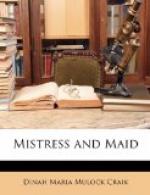Struck by the tone, Ascott stopped in the act of putting on his lilac kid gloves. “What have I done? I may be a very bad fellow, but I’m not quite so bad as that. Aunt Hilary.”
“She didn’t mean it, my boy,” said Aunt Johanna, tenderly.
He was moved, more by the tenderness than the reproach. He came and kissed his eldest aunt in that warm-hearted, impulsive way, which had won him forgiveness for many a boyish fault. It did so now.
“I know I’m not half good enough to you, Auntie, but I mean to be. I mean to work hard, and be a rich man some day; and then you may be sure I shall not let my Aunt Hilary keep a shop. Now, good-night, for I must meet a fellow on business—really business—that may turn out good for us all, I assure you.”
He went away whistling, with that air of untroubled, good-natured liveliness peculiar to Ascott Leaf, which made them say continually that he was “only a boy,” living a boy’s life, as thoughtless and as free. When his handsome face disappeared the three women sat down again round the fire.
They made no comments on him whatever; they were women, and he was their own. But—passing him over as if he had never existed—Hilary began to explain to her sisters all particulars of her new scheme for maintaining the family. She told these details in a matter of-fact way, as already arranged; and finally hoped Selina would make no more objections.
“It is a thing quite impossible,” said Selina, with dignity.
“Why impossible? I can certainly do the work; and it can not make me less of a lady. Besides, we had better not be ladies if we can not be honest ones. And, Selina, where is the money to come from? We have none in the house; we can not get any till Christmas.”
“Opportunities might occur. We have friends.”
“Not one in London; except, perhaps, Mr. Ascott, and I would not ask him for a farthing. You don’t see, Selina, how horrible it would be to be helped, unless by some one dearly loved. I couldn’t bear it! I’d rather beg, starve: almost steal!”
“Don’t be violent, child.”
“Oh, but it’s hard!” and the cry of long-smothered pain burst out. “Hard enough to have to earn one’s bread in a way one doesn’t like; harder still to have to be parted from Johanna from Monday morning till Saturday night. But it must be, I’ll go. It’s a case between hunger, debt, and work: the first is unpleasant, the second impossible, the third is my only alternative. You must consent, Selina, for I will do it.”
“Don’t!” Selina spoke more gently, and not without some natural emotion. “Don’t disgrace me, child; for I may as well tell you—I meant to do so to-night—Mr. Ascott has made me an offer of marriage, and I—I have accepted it.” Had a thunder-bolt fallen in the middle of the parlor at No. 15, its inmates—that is, two of them—could not have been more astounded.
No doubt this surprise was a great instance of simplicity on their part. Many women would have prognosticated, planned the thing from the first; thought it a most excellent match; seen glorious visions of the house in Russell Square, of the wealth and luxury that would be the portion of “dear Selina,” and the general benefit that the marriage would be to the whole Leaf family.




